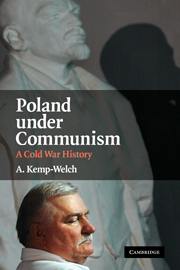9 - Opposition
Published online by Cambridge University Press: 06 January 2010
Summary
The future of Poland will depend upon how many people are mature enough to be non-conformists.
Pope John Paul II, during his Polish pilgrimage (June 1979)If ‘opposition’ meant simply rejection of state authority, then most Poles have been in opposition since the Partitions. A narrower definition, however – the organised attempt to change political leadership and its policies – discloses three major forms of opposition during the communist period. First is the struggle for power, competition for office and influence at the top, which performed the task of opposition in a liberal democracy in replacing one ruling team by another. However undemocratic in actual conduct, this was the usual means by which political succession took place in communist countries. A second form was revisionism, the effort, after Stalin died, to revive the Party, economy and Marxism from within. Its supposition was that no irreconcilable division existed between society and the Party apparatus, which would respond to pressures from ‘in-system reformers’ and make concessions of substance from above. As we have seen, the events of 1968 – the Polish pogrom and the fate of the Prague Spring – put paid to this expectation.
This seemed to leave only one further source of political pressure: non-Party opposition from below. Yet student protests of March 1968 had achieved minimal resonance within the wider society. Moreover, the next round of worker demonstrations in winter 1970–1 received scant support from other classes.
- Type
- Chapter
- Information
- Poland under CommunismA Cold War History, pp. 203 - 236Publisher: Cambridge University PressPrint publication year: 2008

